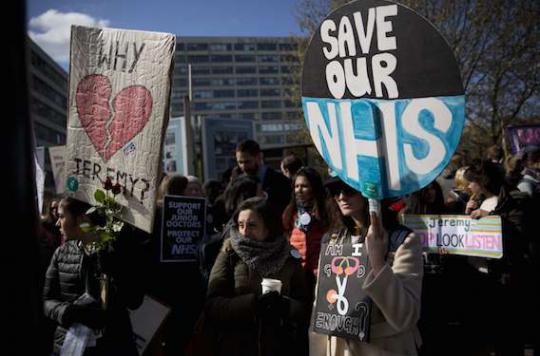Waiting times that are lengthening, interventions canceled, the NHS is going through a deep and lasting crisis. The quality of care is threatened.

The observation is clear: the British health system (NHS) is taking water. Several reports recalled that, despite budgetary efforts, the situation was worsening day by day: canceled operations, longer waiting times, lack of beds, the list is long. Treatments available throughout the week. Yet it was a flagship announcement from the Minister of Health, Jeremy Hunt. The goal was to improve treatment on weekends, a period when waiting times are exploding as are death rates. But the dream of a continuous opening of the NHS could be cut short, according to a report unveiled by the British media The Guardian and Channel 4.
10% of the workforce at risk
Brexit risks reducing the already tight workforce in the healthcare system by a tenth. In fact, 55,000 of its employees come from the European Union. The Institute for Public Policy Research, a British think tank, has also warned Prime Minister Theresa May: leaving the EU could cause the collapse of the NHS. This should spell the end of this measure.
Because the crisis is older than Brexit. Among young doctors, anger is rumbling over salaries and the lack of practitioners in the various establishments. Increasing hours may make the problem worse, not solve it, they say. Their observation is simple: the measure will not ensure patient safety and remains difficult to apply.
The wait is growing
The facts can only prove them right: our neighbor from across the Channel is known for its astronomical waiting times. During 2015, the problem worsened. Feeling the Wait, a report by the Patients Association, points out that 92,700 people waited more than 18 weeks for routine surgery. Compared to the previous year, this number has exploded by 80%.
Targets have been set: NHS establishments should not make their patients wait more than 18 weeks for a classic intervention and 62 days for cancer treatment. But the structures that fail to keep this commitment no longer have to pay a fine since July. A slackening all the more alarming in that in 2015, 753 interventions were canceled every day due to lack of equipment, beds or schedule errors.
Permanent tension
These cancellations are likely to multiply as winter approaches, traditionally busy for the British health system. A map of the government, intended to limit tensions, plans to cancel surgeries to free up beds. Doctors will therefore have the task of sending home all patients who can. In addition, the influenza vaccination campaign will be extended.
But the Royal College of Emergency Medicine itself has warned: the number of doctors and beds is well below the necessary numbers. The United Kingdom has the lowest number of places per person in Europe due to lack of funds. Dr Cliff Mann, President of the College, illustrates the situation in the columns of the Telegraph : “Last winter, the NHS came under enormous pressure despite mild temperatures and low-level influenza. It would only take a large epidemic next winter to overwhelm us. “
Medical errors on the rise
More and more patients consulted in ever less time. The NHS wants to get their accounts back on track, but the price is high. According to health system data, the number of medical errors increased over the period 2005-2015. Unintentional nicks, punctures, punctures and bleeding are 27% more common. More than 6,000 patients are now victims. The Action Against Medical Accidents association sees it as the consequence of more complex interventions and better reporting of incidents.
But the pressure on health professionals, too few compared to the patients in demand, should not be dismissed, according to her. This lack of time, an expatriate testifies on her blog Sushi in my bed : “I have never spent more than three minutes with a doctor,” she explains. The blogger also underlines the lack of coordination between the different structures.
.















-1590362612.jpg)